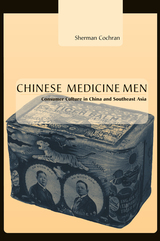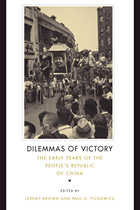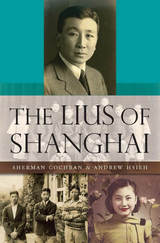
This is the first major study in Chinese business history based largely on business's own records. It focuses on the battle for the cigarette market in early twentieth-century China between the British-American Tobacco Company, based in New York and London, and its leading Chinese rival, Nanyang Brothers Tobacco Company, whose headquarters were in Hong Kong and Shanghai.
From its founding in 1902, the British-American Tobacco Company maintained a lucrative monopoly of the market until 1915, when Nanyang entered China and extended tis operations into the country's major markets despite the use of aggressive tactics against it. Both companies grew rapidly during the 1920s, and competition between them reached its peak, but by 1930 Nanyang weakened, bringing an end to serious commercial rivalry. Though less competitive, both companies continued to trade in China until their Sino-foreign rivalry ended altogether with the founding of the People's Republic in 1949.
Debate over international commercial rivalries has often been conducted broadly in terms of imperialist exploitation and economic nationalism. This study shows the usefulness and limitations of these terms for historical purposes and contributes to the separate but related debate over the significance of entrepreneurial innovation in Chinese economic history. By analyzing the foreign Chinese companies' business practices and by describing their involvement in diplomatic incidents, boycotts, strikes, student protests, relations with peasant tobacco growers, dealings with the Kuomintang and Chinese Communist Party, and a host of other activities, the author brings to light the roles that big businesses played not only in China's economy but also in its politics, society, and foreign affairs.

In this book, Sherman Cochran reconsiders the nature and role of consumer culture in the spread of cultural globalization. He moves beyond traditional debates over Western influence on non-Western cultures to examine the points where Chinese entrepreneurs and Chinese-owned businesses interacted with consumers. Focusing on the marketing of medicine, he shows how Chinese constructed consumer culture in China and Southeast Asia and extended it to local, national, and transnational levels. Through the use of advertisements, photographs, and maps, he illustrates the visual forms that Chinese enterprises adopted and the far-flung markets they reached.
Cochran brings to light enduring features of the Chinese experience with consumer culture. Surveying the period between the 1880s and the 1950s, he observes that Chinese businesses surpassed their Western counterparts in capturing Chinese and Southeast Asian sales of medicine in both peacetime and wartime. He provides revealing examples of Chinese entrepreneurs’ dealings with Chinese and Japanese political and military leaders, particularly during the Sino–Japanese War of 1937–45. The history of Chinese medicine men in pre-socialist China, he suggests, has relevance for the twenty-first century because they achieved goals—constructing a consumer culture, competing with Western-based corporations, forming business-government alliances, capturing national and transnational markets—that their successors in contemporary China are currently seeking to attain.

This illuminating work examines the social, cultural, political, and economic dimensions of the Communist takeover of China. Instead of dwelling on elite politics and policy-making processes, Dilemmas of Victory seeks to understand how the 1949-1953 period was experienced by various groups, including industrialists, filmmakers, ethnic minorities, educators, rural midwives, philanthropists, stand-up comics, and scientists.
A stellar group of authors that includes Frederic Wakeman, Elizabeth Perry, Sherman Cochran, Perry Link, Joseph Esherick, and Chen Jian shows that the Communists sometimes achieved a remarkably smooth takeover, yet at other times appeared shockingly incompetent. Shanghai and Beijing experienced it in ways that differed dramatically from Xinjiang, Tibet, and Dalian. Out of necessity, the new regime often showed restraint and flexibility, courting the influential and educated. Furthermore, many policies of the old Nationalist regime were quietly embraced by the new Communist rulers.
Based on previously unseen archival documents as well as oral histories, these lively, readable essays provide the fullest picture to date of the early years of the People's Republic, which were far more pluralistic, diverse, and hopeful than the Maoist decades that followed.

From the Sino-Japanese War to the Communist Revolution, the onrushing narrative of modern China can drown out the stories of the people who lived it. Yet a remarkable cache of letters from one of China’s most prominent and influential families, the Lius of Shanghai, sheds new light on this tumultuous era. Sherman Cochran and Andrew Hsieh take us inside the Lius’ world to explore how the family laid the foundation for a business dynasty before the war and then confronted the challenges of war, civil unrest, and social upheaval.
Cochran and Hsieh gained access to a rare collection containing a lifetime of letters exchanged by the patriarch, Liu Hongsheng, his wife, Ye Suzhen, and their twelve children. Their correspondence offers a fascinating look at how a powerful family navigated the treacherous politics of the period. They discuss sensitive issues—should the family collaborate with the Japanese occupiers? should it flee after the communist takeover?—as well as intimate domestic matters like marital infidelity. They also describe the agonies of wartime separation, protracted battles for control of the family firm, and the parents’ struggle to maintain authority in the face of swiftly changing values.
Through it all, the distinctive voices of the Lius shine through. Cochran and Hsieh’s engaging prose reveals how each member of the family felt the ties that bound them together. More than simply a portrait of a memorable family, The Lius of Shanghai tells the saga of modern China from the inside out.
READERS
Browse our collection.
PUBLISHERS
See BiblioVault's publisher services.
STUDENT SERVICES
Files for college accessibility offices.
UChicago Accessibility Resources
home | accessibility | search | about | contact us
BiblioVault ® 2001 - 2024
The University of Chicago Press









